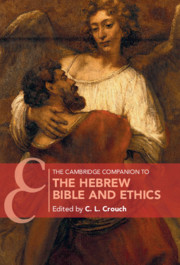Book contents
- The Cambridge Companion to the Hebrew Bible and Ethics
- Cambridge Companions to Religion
- The Cambridge Companion to the Hebrew Bible and Ethics
- Copyright page
- Dedication
- Contents
- Notes on Contributors
- Introduction
- Part I Legal Ethics
- Part II Narrative Ethics
- 6 Creation Ethics in Genesis
- 7 Migrant Ethics in the Jacob Narratives
- 8 Settler Mandates and the Book of Joshua
- 9 David’s Ethic of Togetherness and Its Victims
- 10 Ethics and Ethnicity in the Deuteronomistic History
- Part III Prophetic Ethics
- Part IV Wisdom/Poetic Ethics
- Part V Faithful Ethics
- Index
- Cambridge Companions to Religion (continued from page iii)
- References
7 - Migrant Ethics in the Jacob Narratives
from Part II - Narrative Ethics
Published online by Cambridge University Press: 05 February 2021
- The Cambridge Companion to the Hebrew Bible and Ethics
- Cambridge Companions to Religion
- The Cambridge Companion to the Hebrew Bible and Ethics
- Copyright page
- Dedication
- Contents
- Notes on Contributors
- Introduction
- Part I Legal Ethics
- Part II Narrative Ethics
- 6 Creation Ethics in Genesis
- 7 Migrant Ethics in the Jacob Narratives
- 8 Settler Mandates and the Book of Joshua
- 9 David’s Ethic of Togetherness and Its Victims
- 10 Ethics and Ethnicity in the Deuteronomistic History
- Part III Prophetic Ethics
- Part IV Wisdom/Poetic Ethics
- Part V Faithful Ethics
- Index
- Cambridge Companions to Religion (continued from page iii)
- References
Summary
I am the wrong person to write this essay. I should have recognized this earlier and suggested another author. I did not. Drafting what follows, I became keenly aware that exploring the ethical aspects of the Jacob narrative necessitates a deeper and probably more personal comprehension of marginalization than I have from my current experience.
- Type
- Chapter
- Information
- The Cambridge Companion to the Hebrew Bible and Ethics , pp. 101 - 116Publisher: Cambridge University PressPrint publication year: 2021
References
Further Reading
- 2
- Cited by



